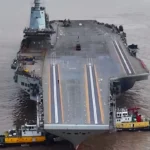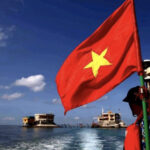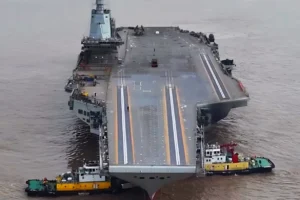In response to Philippine vessels’ provocation in the South China Sea and the continuous hype and smear campaign against China, the Chinese Ministry of National Defense on Friday reiterated its stance and urged related parties to stop provocations and avoid escalating the situation.
Ministry spokesperson Zhang Xiaogang said that on December 10, the Philippines disregarded repeated dissuasion and warnings from China and insisted on sending vessels to the waters adjacent to Ren’ai Jiao (also known as Ren’ai Reef) in the Nansha Islands of China, in an attempt to transport construction materials to its illegally grounded warship on the reef.
During the process, the Philippine ships intentionally collided with China Coast Guard (CCG) vessels in a dangerous manner, resulting in scraping. Some Philippine military personnel also boarded the illegally grounded warship and hyped up the situation.
The CCG took necessary measures to regulate the situation in a professional, restrained, reasonable, and lawful manner at the scene and the Chinese military has lodged a solemn representation with the Philippines, Zhang said.
Also on Friday, Philippine defense chief Gilberto Teodoro claimed that China is attempting to convert the entire sea into its own lake, citing the normal operation of CCG forces, according to media reports.
However, Zhang reaffirmed that China has indisputable sovereignty over Nansha Islands including Ren’ai Jiao and the adjacent waters. The Philippines deliberately provoked and plotted to hype the situation, seriously violating the spirit of the Declaration on the Conduct of Parties in the South China Sea and undermining peace and stability in the region.
Zhang also pointed out that some foreign countries outside the region incited conflicts and fueled the fire out of malicious intentions.
China-Philippines disputes over the South China Sea, particularly concerning the Ren’ai Jiao, reached their peak in 2023 against the backdrop of an upgrade in the US-Philippines security alliance.
Unlike the Duterte administration, under which the diplomatic channel had a bigger say, the Philippine military and US-Philippines military ties appear to dominate the incumbent Philippine government’s attitude to related topics, Ge Hongliang, deputy director of the College of ASEAN Studies at Guangxi University for Nationalities, told the Global Times on Friday.
The possibility cannot be ruled out that the Marcos Jr. administration eyes stronger US support in its military modernization and therefore acts in tighter coordination with the US in regard to the South China Sea, Ge said.
According to analysts, the Philippines has basically abandoned its previous “balance” and willingly acts as a handy tool for the US’ Indo-Pacific Strategy.
Through frequent provocations against China, Manila aims to test the US’ attitude on how much support it can provide over the South China Sea, Ge said.
In one example, the Philippine envoy to the US claimed that the South China Sea, rather than Taiwan island, would be the flashpoint of a potential major conflict in the Asia-Pacific, Nikkei Asia reported Wednesday.
Chinese military expert Song Zhongping told the Global Times on Friday that when the Philippines tries to leverage benefits, the US will not miss any chance to exploit disputes within the South China Sea as a handle to contain China’s development, nor will it hesitate to ally with regional countries to push forward its Indo-Pacific Strategy.
It is not surprising to see US officials voicing support for the Philippines and the US Department of State threatening to apply the 1951 US-Philippines Mutual Defense Treaty in a conflict scenario after the December 10 incident.
But Song warned that Manila, while acting audaciously due to US instigation, should bear in mind the US could be offering only lip service.
The US suddenly emphasized the treaty and alliance with the Philippines in recent years out of its own strategic interests, but no matter what the US does or says, one principle remains the same – other countries can be sacrificed for US security and hegemony, but never vice versa, Song elaborated.
Some countries, including Japan and Canada, issued statements in support of the Philippines, and analysts saw a strong US influence in this smear campaign against China: it uses public opinion and media and the assistance of allies to defame, exaggerate, or distort China’s actions, constantly vilifying China’s influence in the Asia-Pacific to justify and even glorify itself in the region.
Actually, it was the Philippines that changed the status quo in the South China Sea by unilaterally breaking the tacit understanding that it can send only supplies but no construction materials to the grounded warship and inform China of the operation, according to Chen Xiangmiao, director of the world navy research center at the National Institute for South China Sea Studies.
Since 2023, the Philippines has no longer informed China and started to send building materials in an obvious attempt to repair its deteriorating warship and build some permanent facilities such as generators, living quarters and even military fortifications, Chen said.
Source : GlobalTimes
















